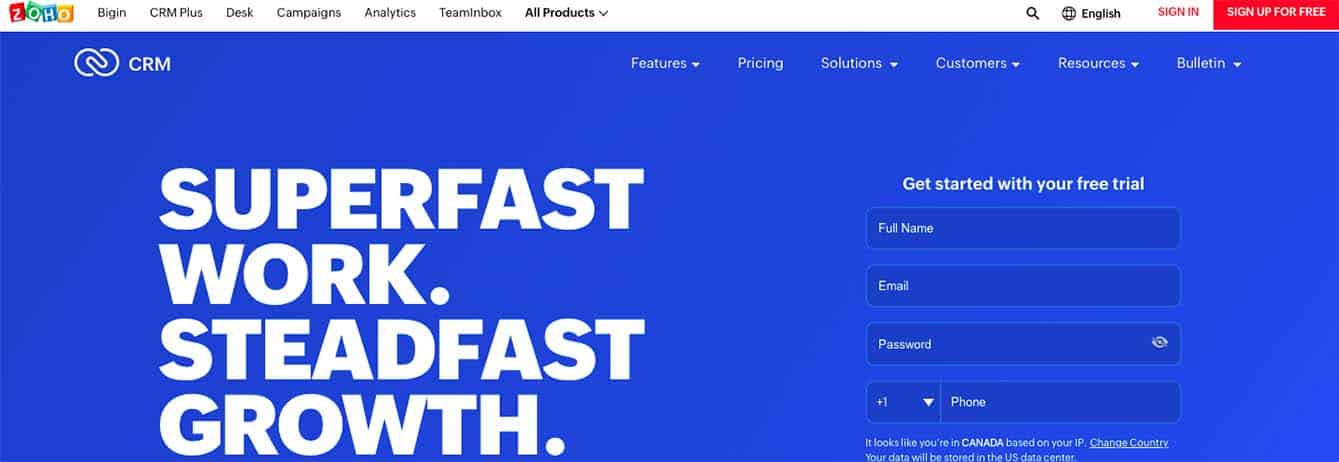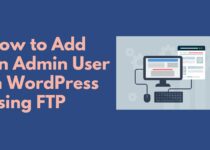7 Best Business Software for Small Businesses: Solutions that Won’t Break the Bank

Are you looking for the best small business software?
Choosing the right business software is crucial for small businesses for several reasons. From automating repetitive tasks to streamlining processes, the best business software can help you meet your goals while saving time and money.
Most businesses need great software to automate repetitive and time-consuming tasks, such as customer relationship management, invoicing, performance analytics, and more. Business software tools allow you to operate efficiently and competitively in today’s digital age.
In this guide, we have scoured the market and narrowed down the top 7 business software. These tools are affordable and easy to manage, give you full control, and allow you to grow your business at scale.
Why Choosing The Best Business Software is Important?
Business software can cover all aspects of your business between website building and sale, including tools that help you track and analyze data and automate other key business functions.
These tools aim to make daily annoying tasks easier and almost always significantly reduce the risk of errors and associated costs. Plus, you don’t need advanced technical skills to use these tools.
By automating tasks, Business software can improve efficiency and productivity, resulting in cost savings and better use of employee time.
Overall, the right tools help make your workflow more efficient so that you can grow your small business faster and smarter.
What Are the Best Tools for Small Businesses?
Here are my picks for the best Business software to help you improve the overall productivity and efficiency of the business.
1. Hostinger — Best Web Hosting Solution for Small Businesses

Hostinger is a web hosting solution that helps businesses get their websites up and running in no time. It is one of the most beginner-friendly web hosting providers and an officially recommended WordPress hosting provider.
Hostinger is one of the fastest-growing web hosting companies in the world of web hosting, with over $19.8 million in revenue and over 29 million users in 2023.
The platform offers a wide range of hosting options with all the tools you’ll need to build your website, including built-in templates, a drag-and-drop editor, free AI tools, an email account and more.
Key Features
- Affordable pricing — They offer one of the lowest per-month plans on the market.
- User-friendly interface — They have an easy-to-use hosting control panel which allows you to manage your hosting account even if you are new to web hosting.
- Reliable uptime —Their platform is highly optimized for WordPress websites.
- Security features — For each website, you get a range of security features, including SSL certificates and daily or weekly backups, to help improve security.
- Customer support —Their customer support is available 24/7 via live chat and email and has a remarkable reputation.
2. Mailchimp — Best Email Marketing Tool for Small Businesses

Mailchimp started in 2001 and steadily grew to become one of the most popular email marketing services today. It now powers more than 20 million users from all over the world.
Mailchimp is a good option for small businesses looking for an email marketing and marketing automation tool. It is user-friendly and offers a range of features designed to help businesses create and send professional-looking emails, build and manage their email lists, and automate their marketing campaigns.
Key Features
- Easy-to-use interface — Their platform is one of the easiest ways to create, optimize, and send professional-looking emails.
- Customizable templates — Offer an extensive library of email templates and landing pages, making it easy for businesses to nurture customer relationships.
- Automation workflows — You can easily automate your email marketing processes based on user behaviour and other triggers.
- Extensive Third-Party Integrations — It integrates with a range of other tools and platforms, including e-commerce, social media, and CRM tools, which can help small businesses streamline their marketing efforts.
- Analytics and reporting — The platform provides detailed analytics and reporting, allowing businesses to track the performance of their campaigns and make confident decisions.
3. Zoho CRM — Best CRM Software for Small Businesses

If you’re a small business owner, finding CRM software with a user-friendly interface will make your journey less daunting. Thankfully, ZOHO CRM offers a simple and intuitive design, making it easy for even non-technical users to get started.
With Zoho, you can easily visualize and track potential customers through different stages of the sales process, enhancing the rate of deal conversions.
Another good news is that Zoho CRM offers a free plan with limited features which allow businesses, especially small businesses, to experiment with the software without any financial risk.
On top of that, the software scales with your business, which means it grows as your business grows. You can start with a basic plan and add features as you need them, avoiding unnecessary costs upfront.
Key Features
- Powerful Analytics — Arguably the most powerful and flexible analytics tool for small businesses. It provides a variety of comprehensive reports that help businesses track their sales performance and identify areas for improvement.
- Omnichannel Engagement — The software allows you to converse in real-time with customers and prospects through multiple channels, including email, phone, social media, and live chat. This provides more convenient ways to interact with businesses than ever before.
- Mobile CRM — Zoho CRM is one of the rarest CRM platforms that offers a mobile app, allowing sales teams to stay connected and productive from anywhere.
- Integrations — Zoho CRM integrates with a variety of business applications, such as e-commerce platforms, accounting software, marketing automation software, and email marketing software. This allows you to streamline processes, improve efficiencies and increase productivity by automating data.
4. Monday.com — Best Project Management Software for Startups

Monday.com is one of the most popular project management software, especially for startups. It gives users a wide range of features to get them started with confidence.
The platform workflows and dashboards are more customizable and flexible than most project management software, making it an ideal choice for startups and big companies. It allows project managers to easily capture and delegate tasks while customizing work views to their project team’s preferences.
Monday.com is the right project management software for teams that prioritize communication and collaboration. It facilitates this through features like file sharing, commenting, and @mentions.
On top of that, Monday.com offers affordable plans with a wide range of features specifically useful for startups.
Key Features
- Easy to Use Interface — monday.com is a great platform for users who want a user-friendly and intuitive interface. No coding knowledge is required, making it easy for teams of all technical backgrounds to embrace and take full advantage of the platform.
- Highly Customizable — monday.com offers a comprehensive and flexible platform that allows businesses to customize boards, workflows, and automation to perfectly match their specific sales process.
- Team Collaboration — The platform makes collaboration more organized through features like shared boards, task assignments, and real-time communication tools. Team members can also collaborate by sharing files, and commenting for efficient project execution.
- Automation Workflows — With monday.com you can improve your processes by automating repetitive tasks to save time and effort. It offers the flexibility to set up automated actions triggered by specific events, such as sending reminder emails, assigning tasks, or updating deal stages. This amazing feature allows your team to work faster to complete more projects.
- Analytics and Reporting — The platform offers built-in reporting tools which allow you to generate reports on key metrics like lead conversion rates, project progress, amount of work done in period, sales cycle length, and team performance.
5. Freshbooks — Best Small-Business Accounting Software

FreshBooks is a powerful multipurpose accounting software built to help you easily streamline your financial processes. It comes with multiple features such as invoicing, expense tracking, time tracking, team management, client communication, online payments, reporting, and more.
The platform is ideal for small businesses who need a user-friendly and affordable way to manage their finances.
One of the standout features of FreshBooks is that it easily integrates with third-party tools like HubSpot CRM, Stripe, Slack, Google Cloud (G Suite), and more. You even get apps for iOS and Android, so your team can manage your finances on the go.
Key Features
- Invoicing — With Freshbooks, it’s easier than ever to create and customize your invoice to fit your brand. Plus, it allows you to send invoices via email and track payment status.
- Collaboration — It allows team members and clients to view and collaborate on invoices and projects, enhancing communication and clarity.
- Generate Reports — This feature provides various reports to gain insights into your financial performance, including profit and loss statements, balance sheets, and customer/vendor reports.
- Integration — You can integrate FreshBooks with popular business tools to make it easier than ever to get all your accounting and payroll tasks done in one place.
6. Shopify — Best Ecommerce Platform for Small Businesses

Shopify is one of the most popular and highest-rated e-commerce platforms in the e-commerce community. It comes with a wide range of features to set up and grow your e-commerce store quickly.
This powerful all-in-one e-commerce platform can empower businesses of all sizes to sell online. From physical products to digital downloads, Shopify makes it easy to launch, manage, and grow your online sales.
Key Features
- Ease of Use Interface — Shopify offers a user-friendly interface with visual elements that make it easy for even beginners to set up and manage their online store in a very short time.
- Product Management — Shopify is a commerce platform that enables users to add, edit, and manage their product listings easily. This includes descriptions, images, and inventory tracking.
- Security and Reliability — The platform has established a robust security feature to protect your store and customer data.
- Customizable Themes: It provides a wide variety of free and paid themes that you can customize with their drag-and-drop editor to fit your brand.
- Analytics and Reporting — Their analytic tool gives you visibility into your store’s performance. These reports include information about sales data, customer behaviour, traffic sources, and more to gain insights and make data-driven decisions.
7. Hootsuite — Best Social Media Management Tool for Small Businesses

If you’re looking for an all-in-one social media management tool for small businesses, Hootsuite is an excellent option.
It’s one of the most reliable platforms that gives you everything you need to manage all your customer conversations.
Detailed information is the name of the game when it comes to Hootsuite’s analytics tools. The platform allows you to easily generate actionable real-time insights from social media for guided marketing strategy—all from one intuitive dashboard.
Key Features
- User-friendly dashboard – Offers an easy-to-understand overview of your social media management.
- Monitor a wide range of social media —Allows businesses to manage multiple social media platforms from a single dashboard.
- Scheduling and publishing tools —With Hootsuite, you can schedule posts for Facebook, TikTok, Twitter, LinkedIn, Pinterest, and Instagram accounts from one dashboard.
- Analytics and reporting — You can monitor the performance of your social media campaigns with extensive and in-depth analytics reports.
Summary
There are a lot of business software for small businesses on the market, and all of them have unique features and benefits.
It’s important to understand that a lot of your success with online business depends entirely on the different software you choose because they are responsible for keeping your business organized by streamlining processes.
I hope this list of top business software helps you choose the right tools for your online business. These tools are some of the best that exist, if any of them are relevant to your marketing efforts, give them a try.


